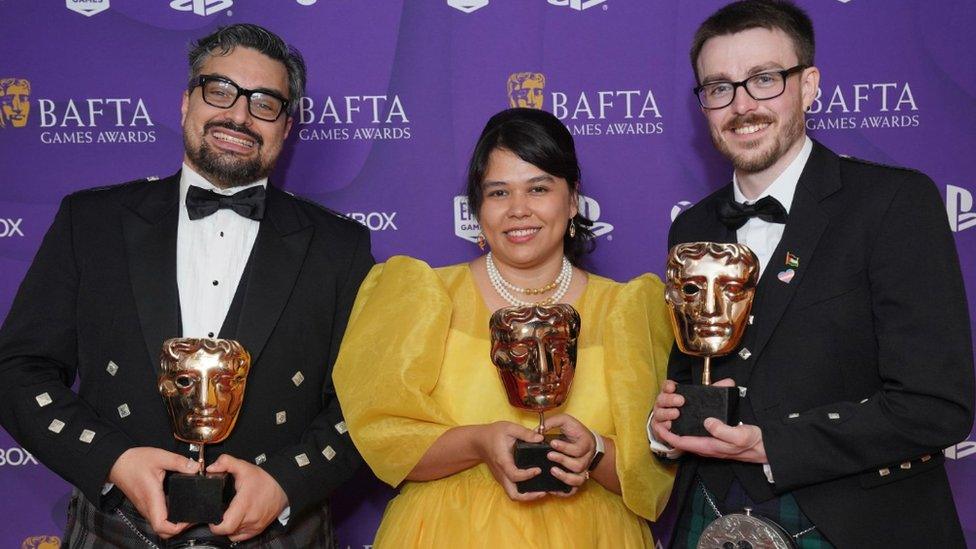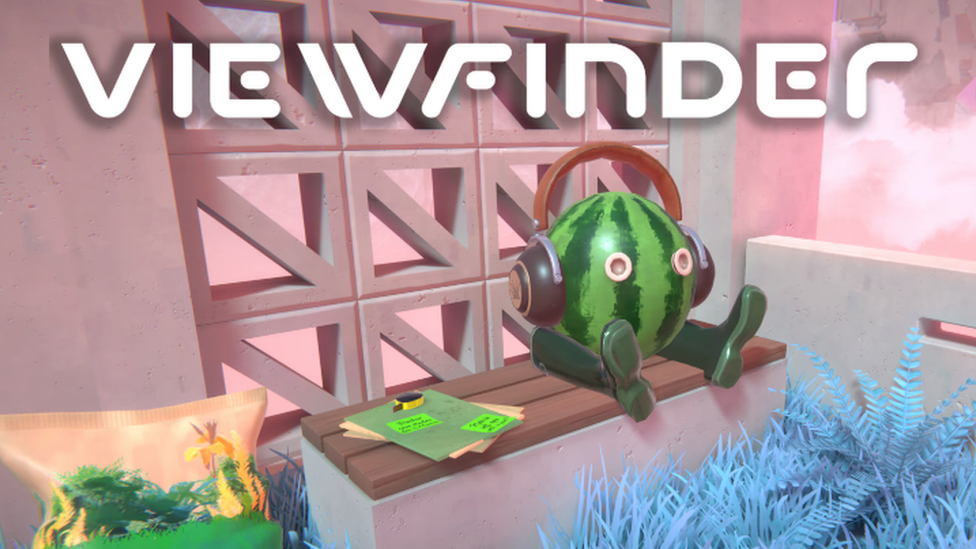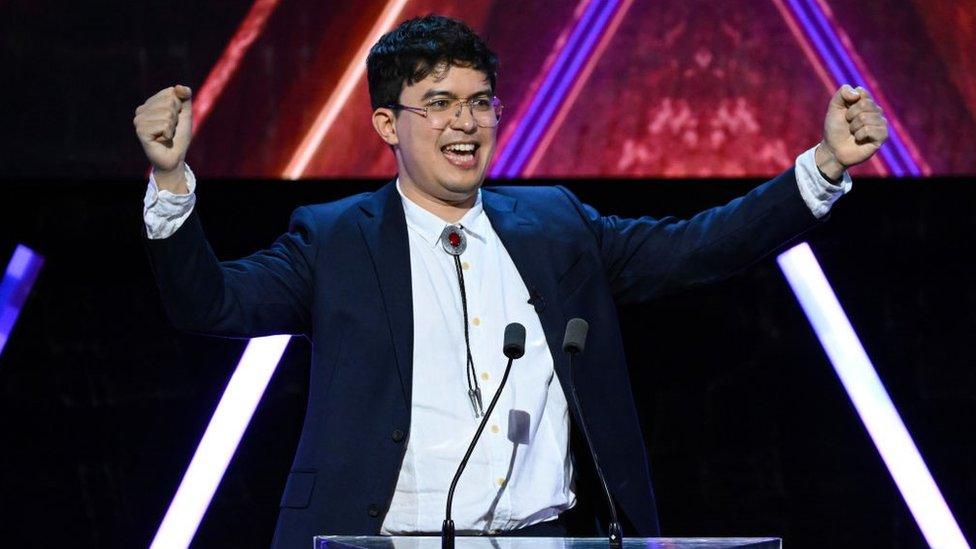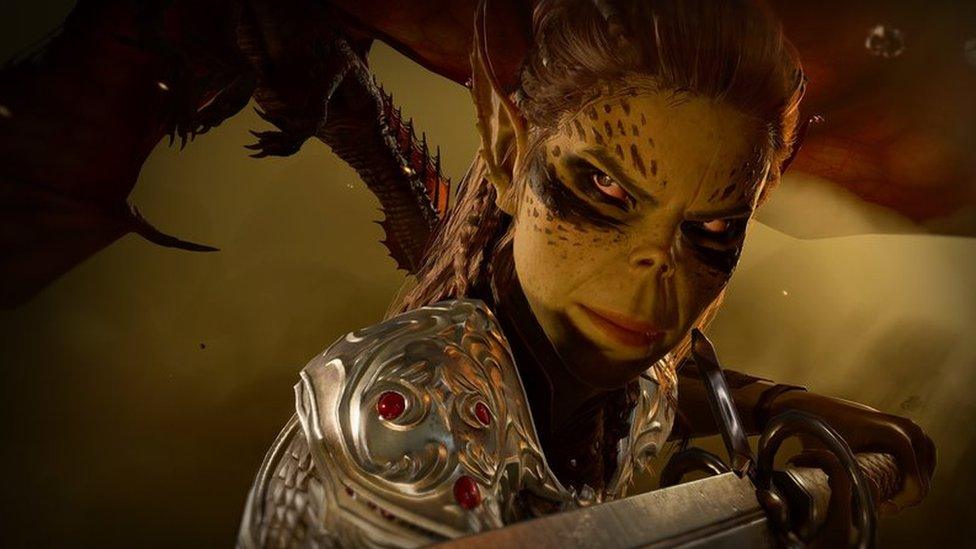Scotland's Sad Owl Studios celebrates BAFTA game win
- Published

The Sad Owl Studios team picked up their Bafta at the Queen Elizabeth Hall in London on Thursday
The Scottish team behind Bafta's best British video game of the year say they want to continue "pushing the boundaries" of the industry.
Sad Owl Studios scooped the top prize for Viewfinder at the 20th Bafta Game Awards on Thursday night.
Viewfinder also won the best new intellectual property category.
It crowned a remarkable success story for the photography-based puzzler which Matt Stark created while studying at Abertay University in Dundee.
The Sad Owl Studios team's first trip to the podium at the Queen Elizabeth Hall in London was one full of tears.
But by the time they returned they joked that they hadn't prepared any speeches, and if people wanted more of their game, they'd first need the money to develop it.
Game director Matt Stark later said building on Viewfinder's early success was their number one priority.

Viewfinder was released last year
He told BBC Radio Scotland's Lunchtime Live programme: "We want to continue doing Viewfinder stuff because there's a lot of interest in the project.
"At the moment, we're exploring our options but it's a very exciting time for us."
He added: "The response has been incredible and the reviews have been amazing.
"I'm incredibly proud of what the team has accomplished. It's been an honour to work with such a talented and dedicated group."
Viewfinder started off as an experiment by indie game developer Stark in 2019 and was officially released for PlayStation 5 and Windows last year.
Its main player/character is a researcher who uses photographic simulations as a way to revitalise an oxygen-starved Earth.

Stand-up comedian Phil Wang hosted the Bafta ceremony
The Bafta victory - announced by host Phil Wang - was all the more remarkable given the massive budgets of the other big winners on the night.
Baldur's Gate 3 won five awards, including the coveted best game title.
The role-playing game based on Dungeons & Dragons also scooped prizes for music and narrative, with an acting award for Andrew Wincott as fan-favourite devil Raphael.
Super Mario Bros Wonder won two, while Star Wars Jedi: Survivor missed out despite having six nominations.
Nintendo also won the Technical achievement prize for The Legend of Zelda: Tears of the Kingdom.
Marvel's Spider-Man 2 came away with just one win despite being nominated nine times overall.

Lae'zel is one of the main characters in Baldur's Gate 3, which won five Baftas
Viewfinder creator Stark told BBC Scotland News it was an incredibly challenging time for lower-budget studios in the face of increasing development of Artificial Intelligence (AI) and post-pandemic financial pressures.
He said: "I hear a lot from fellow game developers about the turbulence in the industry at the moment.
"A lot of people have been affected by lay-offs this past year - it's been really rough for the industry.
"And it's a real shame because it's been an incredible year for the games that have come out.
He added: "It's a really exciting medium to be working in because it is still a new frontier and there are still ways you can push the boundaries in what it can be.
"And while the big games are really cool, I think it's within the indie development space with smaller teams that you really see experimental games that push the boundaries of the medium."
Bafta Games Awards winners:
Debut game: Venba
Audio achievement: Alan Wake 2
Multiplayer: Super Mario Bros. Wonder
Evolving game: Cyberpunk 2077
Game design: Dave the Diver
British game: Viewfinder
Artistic achievement: Alan Wake 2
New intellectual property: Viewfinder
Narrative: Baldur's Gate 3
Performer in a supporting role: Andrew Wincott, Raphael in Baldur's Gate 3
Family: Super Mario Bros. Wonder
EE Players' Choice: Baldur's Gate 3
Animation: Hi-Fi Rush
Music: Baldur's Gate 3
Game Beyond Entertainment: Tchia
Technical achievement: The Legend of Zelda: Tears of the Kingdom
Performer in a leading role: Nadji Jeter, Miles Morales in Marvel's Spider-Man 2
Best game: Baldur's Gate 3